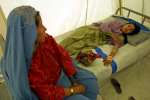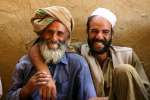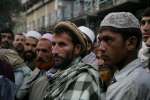- Text size
 |
|  |
|  |
| 
- عربي
Women and children trek exhaustedly into Austrian town of Nickelsdorf to warm welcome
News Stories, 25 September 2015
NICKELSDORF, Austria, Sept 25 (UNHCR) – They stride, sometimes even stumble, over the Austrian border and into the picture postcard town of Nickelsdorf. Among them are women and children, many of whom have been travelling for days, weeks, even months. They fled their war-torn homelands, trekking across Turkey, Greece, and the Balkans.
Now, at last, another 400 refugee journeys are almost at an end.
The newcomers receive a warm welcome in Nickelsdorf. At the border, they collect water and snacks from local volunteers, and then, gathering in a parking lot to wait for trains to Vienna, they are offered clothes, food and first aid by the Red Cross. Children and babies play in the sun. A graze marks the cheek of three-year-old Noor from Syria. "She fell over," explains her older sister, as she gently removes her muddied shoes.
Nahid, a 16-year-old student from Damascus, flashes me a pearly white smile. His mother is searching through boxes for a coat. "I want to be a dentist," he tells me. The pair are heading for the Netherlands, where they hope that the rest of their family will be welcome and can rebuild their lives. For now, with no money, they can only endure a nightmare in Syria.
One little boy wears a stained Mickey Mouse t-shirt that depicts a cheery cartoon scene – a stark contrast to his own world in which his mother sits sobbing beside him on the pavement. She was separated from her husband during the crossing. Although later they will reunite, with emotions running high it is a common scene that plays out time and time again.
For refugees who are able to scrape enough money together, there are taxis to take them to the centre of Vienna. Others are not so lucky and must wait on the tarmac for a train to arrive. Arabic teacher Omar, his wife Eman and their four kids all look exhausted. They sold everything to get this far and now all they have left fits into two simple rucksacks. When I ask Omar about life back home in Syria, he shakes his head, sadly. "All my memories are burned," he says. And, even if the family are safe in Europe, his worries don't end here. "I'm afraid for the future. I'm afraid for my kids."
Locals in Nickelsdorf have been working together to help refugees since the crisis first erupted on 4th September. Irmtraud, 66, is born and bred here, and with around 100 other local volunteers, has been collecting and distributing clothes and food donations. As a mother and a former teacher, she says that seeing families arrive breaks her heart. She pleads with EU leaders to find a solution. "They should look into the eyes of children," she says, firmly. "And they should open their hearts a little quicker."
Over the last few weeks, more than 120,000 refugees and migrants have arrived at Austria's borders, with most crossing from Hungary. In total, more than 15,000 emergency shelter places are available across the country.
Ruth Schöffl, Senior Public Information Associate with UNHCR in Austria, is impressed by the response. "Authorities, NGOs and civil society are working hand in hand to aid refugees and migrants arriving at the borders," she says. "This cooperation and especially the enormous dedication of thousands of volunteers has made it possible that refugees can find a safe haven with a warm meal, a roof over their head and comforting word."
For now, at least, refugees arriving in Nickelsdorf can breathe a sigh of relief. For the future, there is still much to do to ease their desperate plight.
By Kate Bond in Nickelsdorf
















































